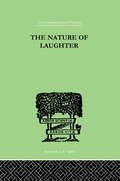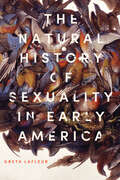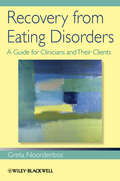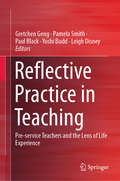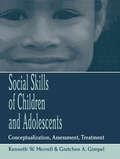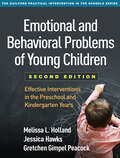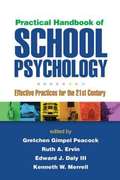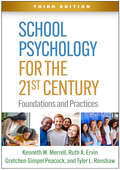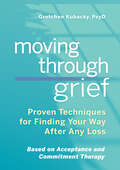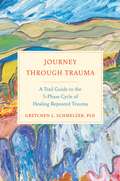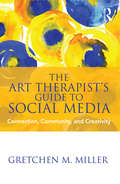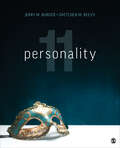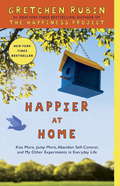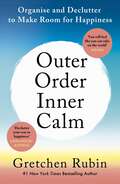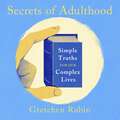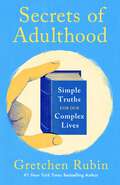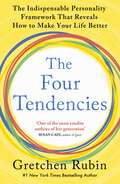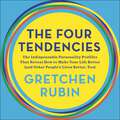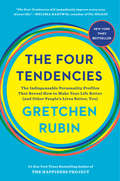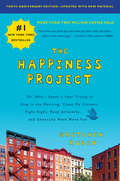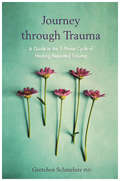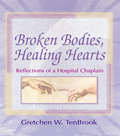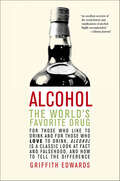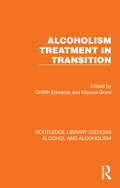- Table View
- List View
The Nature Of Laughter (International Library Of Psychology Ser.)
by Gregory, J CFirst Published in 1999. Routledge is an imprint of Taylor & Francis, an informa company.
The Natural History of Sexuality in Early America
by Greta LaFleurHow natural history made sex scientific in the eighteenth century.If sexology—the science of sex—came into being sometime in the nineteenth century, then how did statesmen, scientists, and everyday people make meaning out of sex before that point? In The Natural History of Sexuality in Early America, Greta LaFleur demonstrates that eighteenth-century natural history—the study of organic life in its environment—actually provided the intellectual foundations for the later development of the scientific study of sex. Natural historians understood the human body to be a "porous envelope," eminently vulnerable to its environment. Yet historians of sexuality have tended to rely on archival evidence of genital-based or otherwise bodily sex acts for source material. Through careful readings of both elite natural history texts and popular print forms that circulated widely in the British North American colonies—among them Barbary captivity, execution, cross-dressing, and anti-vice narratives—LaFleur traces the development of a broad knowledge of sexuality defined in terms of the dynamic relationship between the human and the natural, social, physical, and climatic milieu.At the heart of this book is the question of how to produce a history of sexuality for an era in which modern vocabularies for sex and desire were unavailable. LaFleur demonstrates how environmental logic was used to explain sexual behavior on a broad scale, not just among the educated elite who wrote and read natural historical texts. LaFleur reunites the history of sexuality with the history of race, demonstrating how they were bound to one another by the emergence of the human sciences. Ultimately, The Natural History of Sexuality in Early America not only rewrites all dominant scholarly narratives of eighteenth-century sexual behavior but also poses a major intervention into queer theoretical understandings of the relationship between sex and the subject.
Recovery from Eating Disorders
by Greta NoordenbosWith a uniquely perspective on the key factors in recovery from eating disorders, this practical guide for patients and clinicians draws from relevant, real-life case studies.Focuses on real-life recovery strategies that involve motivational factors, physical and psychological health, and issues such as self-esteem, body attitude, emotion regulation and social relationships.Draws on extensive qualitative research with more than 80 former sufferersOffers experience-based guidance for professionals assisting clients in their recovery process
Reflective Practice in Teaching: Pre-service Teachers and the Lens of Life Experience (Reflective Teaching Ser.)
by Gretchen Geng Pamela Smith Paul Black Yoshi Budd Leigh DisneyThis book investigates the ways in which pre-service teachers develop and articulate their professional knowledge by presenting their reflections on contemporary issues and topics they have explored during their own teaching practicums. It uses reflective practice to connect pre-service teachers’ personal backgrounds with their placement experience concerning a self-selected topic, including teacher educators’ reflections on the pre-service teachers’ reports on these placement topics. By illustrating the broad range of issues encountered by pre-service teachers, sharing multiple perspectives on the complexity of classroom practice, and demonstrating the importance of reflective practice, it also provides a valuable mentoring framework. Moreover, the book studies how examining pre-service teachers’ life experience can facilitate in-depth understanding, specifically in the context of pre-service teachers’ reflections on their own practices in different educational settings. In short, the book helps current and prospective pre-service teachers and teacher educators get to know their students and themselves better using reflective practice.
Social Skills of Children and Adolescents: Conceptualization, Assessment, Treatment
by Kenneth W. Merrell Gretchen GimpelThis scholarly yet highly readable and practical text systematically covers the importance, development, assessment, and treatment of social skills of children and adolescents. Combining scientific rigor with a highly approachable and readable style of writing to create a practical and unique book, this volume provides a comprehensive overview of the increasingly important topic of child and adolescent social skills. A wide variety of tables, figures, and practical step-by-step guides enhance the material presented, making it particularly useful for practitioners while offering an extensive array of recent research and models of interest to researchers. The authors present a solid foundation of scientific knowledge written in a manner accessible to nonscientists and having ample practical implications and examples for educational and clinical practice. The book is divided into two parts--the first features a foundation for conceptualizing and assessing child and adolescent social skills, whereas the second focuses on the arena of intervention. An up-to-date and unique addition to the literature, this volume will be of interest to professionals who work with or study children across several disciplines including school and clinical child psychology, special education, counseling, and social work. Although many books and other professional materials on the social competence of children and adolescents are presently available, the knowledge regarding these social skills is expanding rapidly, and there is a tremendous need to keep it current. This book helps meet this need by not only synthesizing a great deal of recent work in the field, but also by providing new information and evidence that has not yet been published. It also bridges an important gap that sometimes exists between research and practice. For instance, some books on child and adolescent social skills are clearly written for the academician or researcher, and may have little apparent application for the clinician or practitioner. Other materials are written as practical assessment or intervention guides for the clinician/practitioner, yet sometimes lack supporting evidence and rationale. This book is aimed at both arenas.
Emotional and Behavioral Problems of Young Children, Second Edition: Effective Interventions in the Preschool and Kindergarten Years
by Gretchen Gimpel Peacock Jessica Malmberg Melissa L. HollandPresenting interventions that are practical, effective, and easy to implement in educational and clinical settings, this book addresses the most frequently encountered emotional and behavioral problems in 3- to 6-year-olds. Strategies for collaborating with parents are emphasized. Practitioners are taken step by step through assessing and treating conduct problems, anxiety and other internalizing problems, toileting difficulties, picky eating and related concerns, and sleep problems. User-friendly features include 36 reproducible parent handouts, assessment forms, and other clinical tools; the print book has a large-size format with lay-flat binding for easy photocopying. Purchasers get access to a Web page where they can download and print the reproducible materials. This book is in The Guilford Practical Intervention in the Schools Series. New to This Edition *Reflects over a decade of research advances, plus new assessments and interventions. *Updated for DSM-5. *Chapter on intervention within a multi-tiered system of support (MTSS). *Chapter on referral procedures for complex problems. *Mindfulness techniques for both parents and children. *Cutting-edge ways to use acceptance and commitment therapy principles and motivational interviewing with parents. *23 new or revised reproducible tools.
Practical Handbook of School Psychology
by Gretchen Gimpel Peacock Ruth ErvinBringing together leading authorities, this state-of-the-science handbook delves into all aspects of problem-solving-based school psychology practice. Thirty-four focused chapters present data-based methods for assessment, analysis, intervention, and evaluation, with special attention given to working in a response-to-intervention framework. Tools and guidelines are provided for promoting success in key academic domains reading, writing, and math. Social-emotional and behavioral skills are thoroughly addressed in chapters on self-management interventions, peer and family support, cognitive-behavioral interventions, medication use, and more. This accessible work is an invaluable reference for practitioners and an ideal resource for school psychology training programs.
School Psychology for the 21st Century, Third Edition: Foundations and Practices
by Kenneth W. Merrell Ruth A. Ervin Gretchen Gimpel Peacock Tyler L. RenshawNow in a revised and updated third edition reflecting a decade of changes in the field, this leading text prepares new practitioners to support all students' academic, behavioral, and social–emotional success. The multiple roles and functions of the school psychologist are described and illustrated with vivid vignettes. Readers gain vital skills for planning and implementing evidence-based prevention and intervention efforts and collaborating to facilitate systems change. Guided by a problem-solving perspective, the book provides tools for effective, culturally responsive practice in today's diverse schools. End-of-chapter discussion questions and activities enhance learning. New to This Edition *Incorporates key advances in evidence-based assessment, intervention, and multi-tiered systems of support. *Increased attention to supporting the growing numbers of culturally and linguistically diverse students in schools. *Addresses changes in school psychology training programs and professional standards. *New emphasis on implementation science.
Moving Through Grief: Proven Techniques for Finding Your Way After Any Loss
by Gretchen Kubacky PsyDOvercoming your pain—proven strategies for grief recovery Coping with loss is difficult, but that doesn't mean you have to suffer alone. Based on the scientifically proven acceptance and commitment therapy (ACT) approach, Moving Through Grief provides simple and effective techniques to help you get unstuck and start living a rich and fulfilling life again, even after loss. ACT is about embracing all aspects of your experience—including the painful parts—and committing to actions that will improve and enrich your life. Whether you're dealing with the loss of a loved one, your health, home, or livelihood, this guide provides you with creative exercises that will help you work through your pain and reconnect with the things you love. Moving Through Grief includes: Rediscover your life—Learn how you can show up for your life and experience joy and satisfaction, even as you still feel the pain of your loss. Grief recovery toolbox—Discover how the six tools of ACT—values, committed action, acceptance, being present, cognitive defusion, and self-as-context—can expand your perspective and aid with the healing process. Easy-to-use advice—Make real progress toward feeling like yourself again with straightforward exercises, such as identifying your values and setting realistic goals. Find out how ACT can change the way you relate to your pain with Moving Through Grief
Journey Through Trauma: A Trail Guide to the 5-Phase Cycle of Healing Repeated Trauma
by Gretchen L. SchmelzerFor survivors of PTSD and repeated, relational trauma -- and the people who love them.Gretchen Schmelzer watched too many people quit during treatment for trauma recovery. They found it too difficult or too frightening or just decided that for them it was too late. But as a therapist and trauma survivor herself, Dr. Schmelzer wants us to know that it is never too late to heal from trauma, whether it is the suffering caused within an abusive relationship or PTSD resulting from combat. Sometimes what feels like a big setback is actually an unexpected difficult step forward. So she wrote Journey Through Trauma specifically for survivors--to help them understand the terrain of the healing process and stay on the path. There are three basic principles that every trauma survivor should know: Healing is possible. It requires courage. And it cannot be done alone. Traumas that happen more than once--child abuse, sexual abuse, domestic violence, gang violence, even war--are all relational traumas. They happened inside a relationship and therefore must be healed inside a relationship, whether that relationship is with a therapist or within a group. Journey Through Trauma gives us a map to help guide us through that healing process, see where the hard parts show up, and persevere in the process of getting well. We learn the five phases that every survivor must negotiate along the way and come to understand that since the cycle of healing is not linear, circling back around to a previous stage does not mean defeat - it actually means progress as well as facing new challenges. Authoritative and accessible, Journey Through Trauma provides support for survivors and their loved ones through one of the most challenging but necessary processes of healing that anyone can face.
The Art Therapist's Guide to Social Media: Connection, Community, and Creativity
by Gretchen M. MillerThe Art Therapist’s Guide to Social Media offers the art therapy community a guide that addresses content related to social media use, its growing influence, and the impact social networking has on the profession and work of art therapists. This book presents a framework of relevant theories, best practices, and examples to explore existing and emerging areas of social networking's power for art therapists as practitioners and artists. Divided into three sections that highlight the themes of connection, community, and creativity, chapters explore timely topics such as the professional use of social media, ethical considerations, potential benefits and challenges, and strategies to embrace the possibilities that social media can create for the field worldwide. Art therapists in training, art therapy educators and supervisors, and practicing art therapists will find content in this text helpful for their learning and professional practice.
Personality
by Jerry M. Burger Gretchen M. ReevyNow published by SAGE! In Personality, the historical underpinnings of core theories and research come alive through biographical and contextual illustrations. Author Jerry M. Burger, and new co-author Gretchen M. Reevy, use vivid stories and discussions to challenge learners to critically consider the discipline’s approach to diversity, research science, and its future as a holistic field of study. With a balance of both theory and research, along with application sections and personality tests, students gain hands-on experience and a comprehensive understanding of the subject matter. Every chapter in this Eleventh Edition has been thoroughly updated, such as sections on Extraversion-Introversion, Dream Interpretation, and Gender Roles, to reflect the most recent research. It also features 400 new references, a new research topic on Narcissism, and two new personality scales. This title is accompanied by a complete teaching and learning package. Contact your SAGE representative to request a demo. Digital Option / Courseware SAGE Vantage is an intuitive digital platform that delivers this text’s content and course materials in a learning experience that offers auto-graded assignments and interactive multimedia tools, all carefully designed to ignite student engagement and drive critical thinking. Built with you and your students in mind, it offers simple course set-up and enables students to better prepare for class. Learn more. LMS Cartridge: Import this title’s instructor resources into your school’s learning management system (LMS) and save time. Don’t use an LMS? You can still access all of the same online resources for this title via the password-protected Instructor Resource Site. Learn more.
Personality
by Jerry M. Burger Gretchen M. ReevyNow published by SAGE! In Personality, the historical underpinnings of core theories and research come alive through biographical and contextual illustrations. Author Jerry M. Burger, and new co-author Gretchen M. Reevy, use vivid stories and discussions to challenge learners to critically consider the discipline’s approach to diversity, research science, and its future as a holistic field of study. With a balance of both theory and research, along with application sections and personality tests, students gain hands-on experience and a comprehensive understanding of the subject matter. Every chapter in this Eleventh Edition has been thoroughly updated, such as sections on Extraversion-Introversion, Dream Interpretation, and Gender Roles, to reflect the most recent research. It also features 400 new references, a new research topic on Narcissism, and two new personality scales. This title is accompanied by a complete teaching and learning package. Contact your SAGE representative to request a demo. Digital Option / Courseware SAGE Vantage is an intuitive digital platform that delivers this text’s content and course materials in a learning experience that offers auto-graded assignments and interactive multimedia tools, all carefully designed to ignite student engagement and drive critical thinking. Built with you and your students in mind, it offers simple course set-up and enables students to better prepare for class. Learn more. LMS Cartridge: Import this title’s instructor resources into your school’s learning management system (LMS) and save time. Don’t use an LMS? You can still access all of the same online resources for this title via the password-protected Instructor Resource Site. Learn more.
Happier at Home: Kiss More, Jump More, Abandon Self-control, And My Other Experiments In Everyday Life
by Gretchen RubinTolstoy wrote, "Happy families are all alike; every unhappy family is unhappy in its own way." This is the statement that inspired bestselling author Gretchen Rubin to wonder whether she could foster an even greater happiness in her home. During The Happiness Project, the same questions kept tugging at her. How can I raise happy children? How can I maintain a tender, romantic relationship with my spouse--after fifteen years of marriage? How do I keep my Blackberry from taking over my private life? How can I foster a well-ordered, light-hearted atmosphere in my house, when no one else will lift a finger to cooperate?This book is Gretchen's account of her second journey in pursuit of happiness. Prescriptive, easy-to-follow, and anecdotal, Happier at Home offers readers a way of thinking and being that is positive and life-affirming. With specific examples following the calendar year, an intimate voice, and drawing from science and pop culture, this book will resonate with anyone looking to strengthen the bonds of family.
Outer Order Inner Calm: declutter and organize to make more room for happiness
by Gretchen RubinTHE NEW YORK TIMES BESTSELLER'MOVE OVER, MARIE KONDO' Washington Post'EXCELLENT' Telegraph'YOU WILL FEEL LIKE YOU CAN TAKE ON THE WORLD' Grazia'WISHING I HAD A RUBIN TO HELP ME MAKE SENSE OF MY BELONGINGS' Red'DECLUTTER YOUR WAY TO HAPPINESS' Good HousekeepingIn the context of a happy life, a messy desk or a crowded wardrobe is a trivial problem - yet Gretchen Rubin found that getting control of our stuff makes us feel more in control of our lives.Ask yourself: DO I NEED IT? DO I LOVE IT? DO I USE IT?With 150 concrete clutter-clearing ideas, insights, strategies, and sometimes surprising tips, Gretchen tackles the key challenges of creating outer order by explaining how to 'make choices', 'create order', 'know yourself', 'cultivate useful habits' and, of course, how to 'add beauty'.At home, at work, and in life, when we get our possessions under control, we can create a more serene environment. With a sense of fun, and a clear idea of what's realistic for most people, Gretchen suggests dozens of manageable steps to help us achieve the lives we yearn for.ALSO BY GRETCHEN RUBINThe Four Tendencies: the indispensable personality profiles that reveal how to make your life betterANDBetter Than Before: learn how to make good habits and break bad ones, for goodANDHappier At Home: a year-long experiment in making the everyday extraordinary
Secrets of Adulthood: Simple Truths for Our Complex Lives - the inspiring new book from the multi-million copy bestselling Queen of Self-Help
by Gretchen RubinThe #1 New York Times bestselling author of The Happiness Project and Better Than Before distills her key insights into simple truths for living with greater satisfaction, clarity and happiness.The right idea, invoked at the right time, can change your life. Drawing from her long studies of happiness, and also from the challenges she's faced herself, writer Gretchen Rubin has discovered the "Secrets of Adulthood" that can help us manage the complexities of life. To convey her conclusions, she turned to the aphorism - the ancient literary discipline that demands that a writer convey a large truth in a few words.Perhaps you're paralyzed by indecision, struggling to navigate a big change, fighting a temptation, or puzzled by the behaviour of someone you love; whatever you face, the right aphorism can help. From procrastination to the pursuit of happiness, Secrets of Adulthood is filled with witty and thought-provoking reflections such as:* "Recognize that, like sleeping with a big dog in a small bed, things that are uncomfortable can also be comforting"* "Accept yourself, expect more from yourself"* "Easy children raise good parents"* "What can be done at any time is often done at no time"For anyone undergoing a major life transition, such as graduation, career switch, marriage, or moving, or for those just encountering everyday dilemmas, these disarming aphorisms will inspire you by articulating truths that you may never have noticed but instantly recognize.
Secrets of Adulthood: Simple Truths for Our Complex Lives - the inspiring new book from the multi-million copy bestselling Queen of Self-Help
by Gretchen RubinThe #1 New York Times bestselling author of The Happiness Project and Better Than Before distills her key insights into simple truths for living with greater satisfaction, clarity and happiness.The right idea, invoked at the right time, can change your life. Drawing from her long studies of happiness, and also from the challenges she's faced herself, writer Gretchen Rubin has discovered the "Secrets of Adulthood" that can help us manage the complexities of life. To convey her conclusions, she turned to the aphorism - the ancient literary discipline that demands that a writer convey a large truth in a few words.Perhaps you're paralyzed by indecision, struggling to navigate a big change, fighting a temptation, or puzzled by the behaviour of someone you love; whatever you face, the right aphorism can help. From procrastination to the pursuit of happiness, Secrets of Adulthood is filled with witty and thought-provoking reflections such as:* "Recognize that, like sleeping with a big dog in a small bed, things that are uncomfortable can also be comforting"* "Accept yourself, expect more from yourself"* "Easy children raise good parents"* "What can be done at any time is often done at no time"For anyone undergoing a major life transition, such as graduation, career switch, marriage, or moving, or for those just encountering everyday dilemmas, these disarming aphorisms will inspire you by articulating truths that you may never have noticed but instantly recognize.
The Four Tendencies: The Indispensable Personality Profiles That Reveal How to Make Your Life Better (and Other People's Lives Better, Too)
by Gretchen RubinTHE NEW YORK TIMES BESTSELLEROBLIGER? REBEL? QUESTIONER? UPHOLDER? Which one are you? Everyone falls into 1 of 4 personality types and knowing yours could make you happier and more successful. During her investigation to understand human nature, explored most recently in her bestselling Better Than Before, Gretchen Rubin realised that by asking the seemingly dry question 'How do I respond to expectations?' we gain life changing self-knowledge.She discovered that based on their answer, people fit into Four Tendencies: Upholders, Questioners, Obligers, and Rebels. Our Tendency shapes every aspect of our behaviour, so using this framework allows us to make better decisions, meet deadlines, suffer less stress, and engage more effectively.More than 800,000 people have taken her online quiz, and managers, doctors, teachers, spouses, and parents already use the framework to help people make significant, lasting change. The Four Tendencies hold practical answers if you've ever thought...- People can rely on me, but I can't rely on myself- How can I help someone to follow good advice?- People say I ask too many questions- How do I work with someone who refuses to do what I ask - or who keeps telling me what to do?With sharp insight, compelling research, and hilarious examples, The Four Tendencies will help you get happier, healthier, more productive, and more creative.'I love Gretchen Rubin - she helps me understand both myself and the people around me' CATHY RENTZENBRINK, OBLIGER 'If you want to change anything in your life you need Gretchen Rubin' VIV GROSKOP, REBELALSO BY GRETCHEN RUBINOuter Order Inner Calm: declutter and organize to make more room for happinessANDBetter Than Before: learn how to make good habits and break bad ones, for goodANDHappier At Home: a year-long experiment in making the everyday extraordinary
The Four Tendencies: The Indispensable Personality Profiles That Reveal How to Make Your Life Better (and Other People's Lives Better, Too)
by Gretchen RubinTHE NEW YORK TIMES BESTSELLEROBLIGER? REBEL? QUESTIONER? UPHOLDER? Which one are you? Everyone falls into 1 of 4 personality types and knowing yours could make you happier and more successful.During her investigation to understand human nature, explored most recently in her bestselling Better Than Before, Gretchen Rubin realised that by asking the seemingly dry question 'How do I respond to expectations?' we gain life changing self-knowledge.She discovered that based on their answer, people fit into Four Tendencies: Upholders, Questioners, Obligers, and Rebels. Our Tendency shapes every aspect of our behaviour, so using this framework allows us to make better decisions, meet deadlines, suffer less stress, and engage more effectively.More than 800,000 people have taken her online quiz, and managers, doctors, teachers, spouses, and parents already use the framework to help people make significant, lasting change. The Four Tendencies hold practical answers if you've ever thought...- People can rely on me, but I can't rely on myself- How can I help someone to follow good advice?- People say I ask too many questions- How do I work with someone who refuses to do what I ask - or who keeps telling me what to do?With sharp insight, compelling research, and hilarious examples, The Four Tendencies will help you get happier, healthier, more productive, and more creative.'I love Gretchen Rubin - she helps me understand both myself and the people around me' CATHY RENTZENBRINK, OBLIGER 'If you want to change anything in your life you need Gretchen Rubin' VIV GROSKOP, REBELALSO BY GRETCHEN RUBINOuter Order Inner Calm: declutter and organize to make more room for happinessANDBetter Than Before: learn how to make good habits and break bad ones, for goodANDHappier At Home: a year-long experiment in making the everyday extraordinary
The Four Tendencies: The Indispensable Personality Profiles That Reveal How to Make Your Life Better (and Other People's Lives Better, Too)
by Gretchen RubinNEW YORK TIMES BESTSELLER • Are you an Upholder, a Questioner, an Obliger, or a Rebel? From the author of Better Than Before and The Happiness Project comes a groundbreaking analysis of personality type that &“will immediately improve every area of your life&” (Melissa Urban, co-founder of the Whole30). During her multibook investigation into human nature, Gretchen Rubin realized that by asking the seemingly dry question &“How do I respond to expectations?&” we gain explosive self-knowledge. She discovered that based on their answer, people fit into Four Tendencies: • Upholders meet outer and inner expectations readily. &“Discipline is my freedom.&” • Questioners meet inner expectations, but meet outer expectations only if they make sense. &“If you convince me why, I&’ll comply.&” • Obligers (the largest Tendency) meet outer expectations, but struggle to meet inner expectations—therefore, they need outer accountability to meet inner expectations. &“You can count on me, and I&’m counting on you to count on me.&” • Rebels (the smallest group) resist all expectations, outer and inner alike. They do what they choose to do, when they choose to do it, and typically they don&’t tell themselves what to do. &“You can&’t make me, and neither can I.&” Our Tendency shapes every aspect of our behavior, so using this framework allows us to make better decisions, meet deadlines, suffer less stress, and engage more effectively. It&’s far easier to succeed when you know what works for you. With sharp insight, compelling research, and hilarious examples, The Four Tendencies will help you get happier, healthier, more productive, and more creative.
The Happiness Project, Tenth Anniversary Edition: Or, Why I Spent a Year Trying to Sing in the Morning, Clean My Closets, Fight Right, Read Aristotle, and Generally Have More Fun
by Gretchen Rubin#1 New York Times Bestseller“An enlightening, laugh-aloud read. . . . Filled with open, honest glimpses into [Rubin’s] real life, woven together with constant doses of humor.”—Christian Science MonitorGretchen Rubin’s year-long experiment to discover how to create true happiness. Drawing on cutting-edge science, classical philosophy, and real-world examples, Rubin delivers an engaging, eminently relatable chronicle of transformation. This special 10th Anniversary edition features a Conversation with Gretchen Rubin, Happiness Project Stories, a guide to creating your own happiness project, a list of dozens of free resources, and more.Gretchen Rubin had an epiphany one rainy afternoon in the unlikeliest of places: a city bus. “The days are long, but the years are short,” she realized. “Time is passing, and I’m not focusing enough on the things that really matter.” In that moment, she decided to dedicate a year to her happiness project.In this lively and compelling account—now updated with new material by the author—Rubin chronicles her adventures during the twelve months she spent test-driving the wisdom of the ages, current scientific research, and lessons from popular culture about how to be happier. Among other things, she found that novelty and challenge are powerful sources of happiness; that money can help buy happiness, when spent wisely; that outer order contributes to inner calm; and that the very smallest of changes can make the biggest difference.This updated edition includes:An extensive new interview with the authorStories of other people’s life-changing happiness projectsA resource guide to the dozens of free resources created for readersThe Happiness Project ManifestoAn excerpt from Rubin’s bestselling book The Four Tendencies: The Indispensable Personality Profiles that Reveal How to Make Your Life Better (and Other People’s Lives Better, Too)
Journey Through Trauma: A Trail Guide to the 5-Phase Cycle of Healing Repeated Trauma
by Gretchen SchmelzerAs a therapist, Gretchen Schmelzer has watched far too many people quit during treatment for trauma recovery. They find it too difficult or frightening, or they decide that it's just too late for them. Schmelzer wrote Journey Through Trauma specifically for survivors to help them understand the terrain of the healing process and stay on the path.She begins by laying out three important assumptions that support a survivor's healing: that it is possible, that it requires courage and that it cannot be done alone. Traumas that happen more than once - child abuse, sexual abuse, domestic violence, gang violence, war - are all relational traumas. They are traumas that happen inside a relationship and therefore must be healed inside a relationship, whether that relationship is with a therapist or within a group. She then guides readers through the five phases that every survivor must negotiate: Preparation, Unintegration, Identification, Integration and Consolidation. She creates a mental map of the healing process that helps survivors recognize where they are in their journey to health, see where the hard parts occur and persevere in the process of getting well. Since the cycle of healing repeated trauma is not linear, the survivor comes to understand that circling back around to a previous stage actually means progress as well as facing new challenges. Ultimately, the healing journey is one of trust, as survivors come to trust their capacity to rely on help from others and to trust themselves and the work they have done.
Broken Bodies, Healing Hearts: Reflections of a Hospital Chaplain
by Harold G Koenig Gretchen TenbrookWitness the wonder of divine power when faith in God overcomes human frailty!Broken Bodies, Healing Hearts: Reflections of a Hospital Chaplain provides chaplains, doctors, nurses, psychologists, and counselors with insight into the experiences of individual hospital patients. You'll learn of the suffering that they endure, and what patients and caretakers can learn about themselves and God through their ordeals. This is a wonderful collection of descriptive, personal, and heartfelt essays, each derived from a visit with a particular patient. These episodes demonstrate the wonder of divine strength manifested in human frailty. You'll see the spiritual aspects of both significant and common events, inspiring you to contemplate and appreciate all of your life experiences. Broken Bodies, Healing Hearts will help you unravel daily questions and problems and encourage you to seek God's eminent presence in all of your experiences.This intriguing collection demonstrates what it means to be human and what it means to be made in God's likeness. You will explore the heartwrenching struggles of unique individuals, such as:Jimmy Meyer, a three-year-old toddler with a terminal brain tumor, who takes each day for whatever it could offer him. His simple trust teaches us all to grow in our faith and seek the child within ourselves Mr. Nelson, who after suffering a heart attack and facing the possibility of death, recounts how the experience served to turn his life from one of anger and resentment to one of peace and freedom, reminding us all of the healing power of grace when we are willing to receive it Martha Claxton, a fifty-eight-year-old woman battling leukemia. In finally letting go she experiences God's eternal security, inviting each of us to surrender our lives to the One who knows our every need Ms. May, a thirty-eight-year-old with Down's Syndrome, who touches all those whom she comes in contact with. Her ability to live fully in the present moment reminds us that whatever is happening now is worth our undivided attentionEnlightening and moving, Broken Bodies, Healing Hearts reveals the presence of God in the lives of patients, chaplains, and all those who care for others. You will discover the connection between human vulnerability and spiritual growth.
Alcohol: The World's Favorite Drug
by Griffith EdwardsAlcohol can be an item of diet, a medicine, sometimes an element in religious ritual. It is a valued object for the connoisseur, a traded commodity and a symbol of national pride (wine for instance in France, whisky in Scotland). The range of social and medical problems associated with alcohol and the history of related treatment methods (including the temperance movement, prohibition, AA and a range of contemporary approaches) are considered here. Already considered a classic in the field in England, Alcohol has proved to be fascinating reading for drinkers and nondrinkers alike.
Alcoholism Treatment in Transition (Routledge Library Editions: Alcohol and Alcoholism)
by Griffith Edwards Marcus GrantOriginally published in 1980, the purpose of this book was to aid a process of rethinking alcoholism treatment. Such a process was already underway in many parts of the world at the time. It was hoped that this volume would be useful in the modest role of abetting such a rethinking. Alcoholism treatment was definitely in transition, abandoning old certainties, searching for new syntheses and that is the position this book takes looking for an alternative understanding. The book is divided into six parts: Transition as Challenge; Does Treatment Work?; Towards Better Questions and Better Methodologies; Treatment System as Case For Study; Models in Transition; and Alcohol Agendas. The book also contains one chapter that discusses alcoholism treatment in a developing country, not often addressed at the time but acknowledgement that the problem is a global one.
